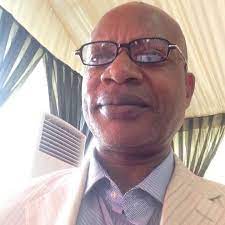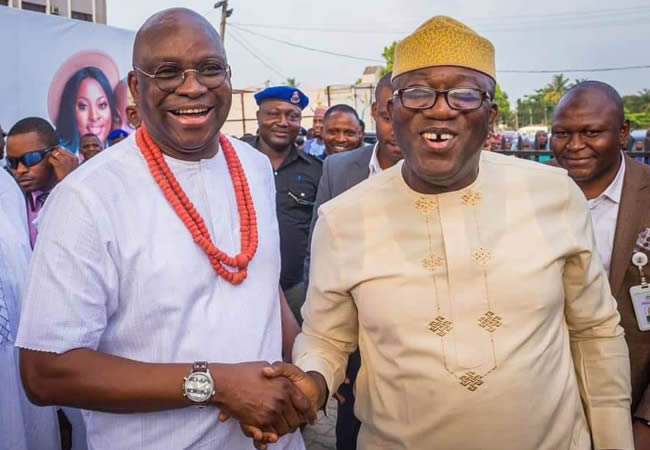By Ehichioya Ezomon
In Ekiti politics, every notable politician claims to be a kingmaker. None, at least openly, acknowledges having been assisted by others to climb the ladder to where they’re politically.
That’s why at every election, they, too, want to be the king, as witnessed in last week’s primaries by the two dominant political platforms, for the June 18, 2022, governorship poll in the state.
So, to keen watchers of the polity, the results of the primaries weren’t much of a surprise, but the bombshell is the free-fall of the big-name and mighty politicians that took part in the processes.

In spite of the larger-than-life image carved for themselves, many of the aspirants, without even casting a ballot, had foreseen defeats, but hoped, like all Nigerian politicians, that a miracle could happen.
In the run-up to the contests, all the boastful politicians had literally written, in their favour, the outcomes of the primaries of the opposition Peoples Democratic Party (PDP) and the ruling All Progressives Congress (APC), respectively.
But when the real balloting were held by the PDP on Wednesday, January 26, and the APC on Thursday, January 27, in that order, the politicians, not short of excuses, fell like a pack of cards.
During the campaigns for the primaries, politicians on both divides had complained about the processes being manipulated against them by the state leaders of the PDP and APC: former Governor Ayodele Fayose and Governor Kayode Fayemi.
Specifically, the aspirants, while presenting themselves as “the best man/woman for the job” of governor, had accused the past and current governors of “anointing” their favourites, for whom they’re gaming the processes ahead of the primaries.
The PDP aspirants alleged scheming of the congresses by Mr Fayose, to favour his protégée, Otunba Bisi Kolawole, at the primaries, and to swing the June poll for the rival APC.
They alleged that Fayose had received a princely amount from Governor Fayemi, in order for the PDP to present “an unviable candidate,” for a “walk-over” by the APC at the June election.
Repeated interventions by the national headquarters and South-West branch of the PDP didn’t seem to work, as the allegations continued into the primaries on January 26 in Ado-Ekiti.
For instance, a key PDP aspirant, representing Ekiti South, Senator Abiodun Olujinmi, playing the hot-button gender card, “and an unfair resolution of matters arising from a lingering controversial congress of the party,” pulled out of the primaries before kick-off.
In a press interview, she said the list prepared for the primary election put her at “a disadvantage,” as her local government “is left with only 12 delegates,” as decided by the party leadership.
In other words, Olujinmi, besides seemingly relying solely on the votes of delegates from her local government, had banked on being treated specially as a female, to gain the PDP ticket. And sensing that none of her expectations would materialise, exited the poll.
When the results of the delegate primaries were called, the sceptical aspirants’ misplaced claims to political formidability, rather than their fears, were overwhelmingly debunked.
Fayose’s anointed candidate, Otunba Kolawole, a former member of the Ekiti State House of Assembly, who resigned as the PDP chapter chairman to contest in the primaries, trounced former Governor Segun Oni and others, including Senator Olujinmi.
The Chairman of the Primary Election Committee and Governor Udom Emmanuel of Akwa Ibom, declared Kolawole as the winner of the election, having polled 671 votes against 330 votes by Chief Oni, who placed second.
While former Deputy Governor to Fayose and PDP’s candidate in the 2018 polls, Prof. Kolapo Olusola, came third with 93 votes, Adewale Aribisala scored 56 votes, Kayode Adaramodu 10 votes, Kazeem Ayodeji six votes, Olujimi two votes, and the remaining four aspirants ostensibly got their self-cast ballot of one vote each.
Oni, who succeeded Fayose in his first coming as governor between 2003 and 2006, rejected the results, on the grounds that the delegates’ register was mutilated and many delegates’ names were missing from the register.
Slamming the results, the Director-General of the Segun Oni Campaign Organisation, Mr. Yemi Arokodare, accused Governor Emmanuel of threatening to “arrest and lock up some 32 “automatic delegates,” even as the governor “deliberately” allowed Fayose “to sit in the hall after he has voted,” a situation, Arokodare said, was against the rules earlier pronounced by Emmanuel.
“Udom (Emmanuel) allowed aides of Fayose to sit in the hall purposely to intimidate other delegates,” Arokodare said, alleging, as Chief Oni had done prior to the primaries, that Fayose was chairman of the primary committee that oversaw Emmanuel’s election in Akwa Ibom, and that the Ekiti PDP primary poll was “a payback for Ayo Fayose.”
It’s a similar story in the APC, but more intriguing, as seven of the eight aspirants pulled out in the morning of the primaries, over alleged manipulation of the processes in favour of Mr. Biodun Oyebanji, reportedly backed by Governor Fayemi.
The primaries were almost a repeat of the 2018 experience, in which political thugs, engineered by aspirants, who smelt defeat at the poll, disrupted the franchise, with security agents deployed to the venue standing by while the mayhem persisted.
So, the big guns, who called for the stoppage and cancellation of the primaries, were trounced by Oyebanji, immediate past Secretary to Ekiti State, who resigned to contest in the primaries.
The results, as announced by the Chairman of the Primary Election Committee and Governor Abubakar Badaru of Jigawa State, showed that Oyebanji won in all 16 local government areas of Ekiti, securing 101,703 votes from the 107,877 accredited members.
The breakdown of the results for other aspirants are as follows: Sen. Opeyemi Bamidele, 760 votes; Mr. Femi Bamisile, 400; Mr. Kayode Ojo, 767; Sen. Adedayo Adeyeye, 691; Mr. Bamidele Faparusi, 376; Mr. Ademola Popoola, 239 and Chief Oluwasola Afolabi, 47 votes in the “Option A4” variant of direct primary adopted for the poll.
Governor Badaru expressed shock that the aspirants boycotted the primaries he said were free and fair, noting that, “as we have earlier promised, we have ensured a level-playing ground for all aspirants.”
He denied allegations by the aspirants that they weren’t consulted, saying that 20 names each were submitted by the aspirants, “and added to the list of Returning Officers and they were all captured.”
Badaru explained that a meeting between the committee and the aspirants, slated for the primary morning, was cancelled “because there was security report that the venue was tensed,” and the committee called for security assistance to arrest the situation.
As winners and losers in the PDP and APC await intervention of their parties’ Appeals Committees, either to approval or cancel the balloting, the January 26 and 27 primaries have indicated that when “push comes to shove,” many politicians are mere paper tigers.
Consider the performances of Chief Oni, Senator Olujinmi, Chief Adeyeye and Mr Bamisile (who vigorously canvassed zoning the governorship to Ekiti South), hiding under nebulous allegations of hijacking and manipulation of the processes, to boycott and/or reject the primaries they’d vowed they’re the aspirants to beat.
Particularly noteworthy is Governor Fayemi’s acceding to the agitation for direct primaries in the APC, mostly championed by Senator Bamidele, who expressed optimism that the contest would be credible, only to join six other aspirants to shun the voting.
Finally, the primaries have revealed that there’re “real kingmakers” in Ekiti politics in Mr Fayose and Governor Fayemi. Though Fayose, as incumbent, had “anointed” Prof. Olusola in 2018, it’s the backing, out of power, for Otunba Kolawole that’s proved his political mettle.
Similarly, Dr Fayemi’s crowing of himself as candidate of the APC in 2018 was largely ignored, but this time, he’s deployed the power of incumbency to produce a candidate, who, like Fayose’s candidate, might receive the crown jewel in the June 2022 poll.
* Mr. Ezomon, Journalist and Media Consultant, writes from Lagos, Nigeria.
Facebook Comments





GIPHY App Key not set. Please check settings